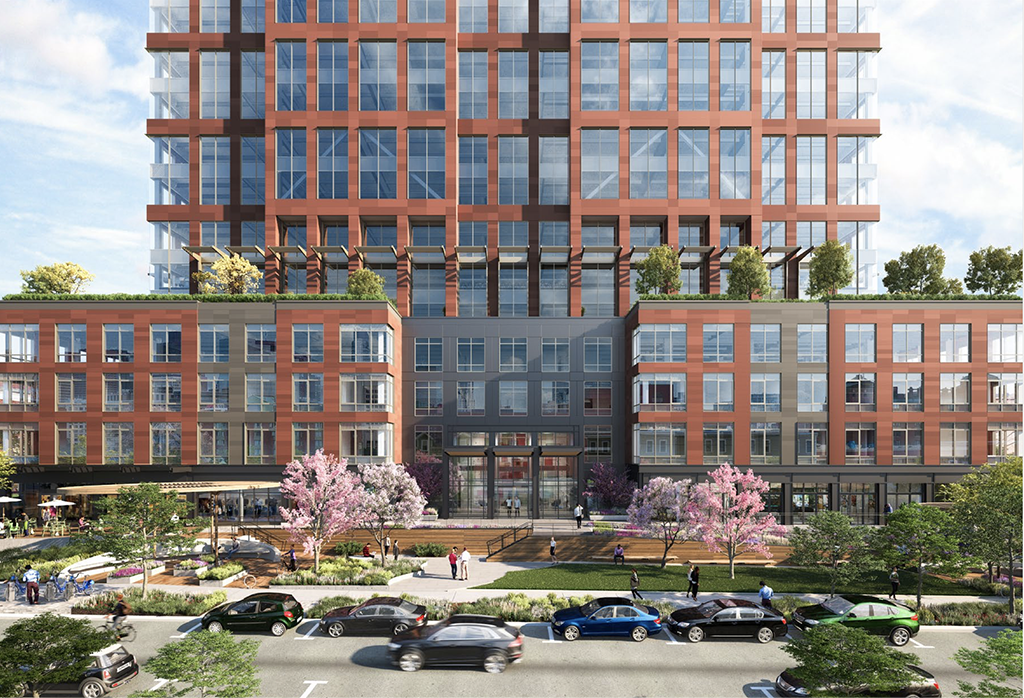Developers of former courthouse say their tower is funded, nearly abated and set to open fall 2023

A rendering of 40 Thorndike as imagined upon completion in the fall of 2023. (Image: Leggat McCall/Granite)
The developers of 40 Thorndike, the office tower project that led to years of neighborhood and political conflict in East Cambridge, issued a progress report Wednesday: Interior demolition and abatement for mold and asbestos is nearing completion, full capital funding has been secured and the project is on track to open in the fall of 2023.
Construction began in 2020 on the Leggat McCall Properties and Granite Properties project, a 475,000-square-foot, 20-story office tower with 48 units of housing and retail space on its second and third floors. After a cleanup of the building’s interior, Phase two construction work recently began on the installation of a terracotta façade and glass skin, Leggat said in a press release.
The building is designed by Elkus Manfredi Architects and being constructed by John Moriarty & Associates.
One way work has progressed: Construction that starts before 7 a.m. and goes to 11 p.m. “They have been horrible neighbors,” said Heather Hoffman, who lives on nearby Hurley Street. She credited Moriarty with more recently starting its day later, quipping, “I always like to be awakened by the sound of jackhammers on concrete.”
The former 1970s-era Edward J. Sullivan Courthouse had been empty since June 2014 and deteriorating under the watch of the state Division of Capital Asset Management and Maintenance – to the point that residents living nearby worried about their health. A lawsuit and appeal, and then a battle over the parking disposition, delayed work at the courthouse by the developer.
The Wednesday release didn’t include a recent price estimate; the company bid $33 million for the property in 2014 and, in the fall of 2019 when getting the vote allowing the project, said remediation of the building alone could cost $50 million.
Funded
Bank OZK, a construction financing firm based in Little Rock, Arkansas, had been the project’s sole lender; it is being joined by CBRE Global Investors of Los Angeles as an equity partner on behalf of one of the firm’s investment funds, according to the press release. Jones Lang LaSalle, a commercial real estate services company based in Chicago that will serve as the eventual leasing agent for the property, arranged the funding as a capital market broker.
This is all business as usual within the development industry, said David Sacco, a practitioner in residence of finance from the Pompea College of Business at the University of New Haven in Connecticut.
“You can use the analogy of a house mortgage,” Sacco said. “When someone buys a house, you don’t really buy a house – you go to a bank and you get a loan by putting down some percentage in a down payment, so the bank is essentially financing the purchase of the house. This is just that simple: Before the banks will lend money they want to have somebody who is basically taking an equity position, i.e., the owner. On big commercial real estate projects, it is typically some equity investor.”
In the unlikely case Leggat’s 40 Thorndike is a flop despite Cambridge’s insatiable need for office space and gravity-defying real estate prices, “the bank gets their money first. And then the equity owner is in line behind the bank,” Sacco said. “In any kind of real estate transaction, the equity investor is important because they’re the ones who are taking the risk of the initial losses.”
The development team said it will “continue to meet regularly with the community to provide updates on construction.”




Would have been nice to read a quote from a nearby resident who is supportive of the project or at least not an outspoken opponent.
We’ve been through this before, Dan.
Yes, we have. Which is why I’m surprised you didn’t think that it might make sense to present the perspective of a nearby resident who thinks the disruption is an acceptable price to pay.
I refer you to our previous conversation.
Great to see development on this property. Its been an eyesore since 2014
Great to see the YIYBYs (Yes In Your Back Yard, h/t to Craig Kelley) flocking here to opine that people in other neighborhoods don’t deserve the protection of the work hours law. I might grumble to myself or my husband about noise after 7 am, but I don’t complain about it. This project, as the story truthfully reports, has been starting regularly before 7 am, with some neighbors telling me (because they are afraid of retaliation if they speak publicly themselves) that they often hear loud construction noise starting at 6 am.
Heather is correct, justified and many people in the neighborhood feel that way. It’s not about being against the developers it’s about getting them to follow the rules- the normal work hours and the City noise ordinance which is for the protection and well being of citizens.
During this pandemic there are more folks than ever at home whether working or retired and it’s enough that they have to endure the jackhammering all day- but to ask them to somehow be grateful to have to endure it in the very early morning hours and we’ll into the night which can occur Monday to Saturday is way beyond reasonable. No one is asking for a work stoppage, simply to be granted the same rights as every other citizen in every other neighborhood by following the law. It’s not like we can expect to be over and done with this one isolated project by somehow “sacrificing ourselves for the greater good and the profits of this particular developer – there are many other projects soon to follow. So if we can lay down the law of respect for residents now we’ll all be a whole lot better.